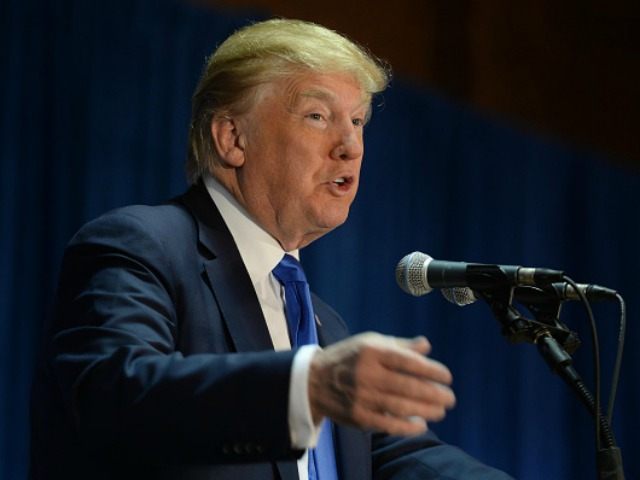An Economist/YouGov survey finds Republican voters overwhelmingly prefer Donald Trump’s position on immigration to that of his rivals.
Ohio Gov. John Kasich and Jeb Bush both challenged Trump on immigration at the fourth GOP debate. Trump has campaigned on building a wall on the border with Mexico and supports deportation for immigrants in the country illegally.
But the survey found that 49 percent of Republicans and Republican-leaning Independents say Trump is the candidate best able to handle the issue of immigration. Republicans’ preference for Trump on the issue is so overwhelming one pauses to remember that he is running against a crowded field of competitors.
After Trump, “Not Sure” registers higher with voters, at 13 percent, than any other candidate on who is best able to handle the issue. Only 16 percent of Republicans prefer Florida Sen. Marco Rubio, Jeb Bush or John Kasich, all of whom have staked out very moderate positions on the issue, to handle illegal immigration.
Trump’s dominating position on the issue is a function both of how prominently he has elevated the issue in his campaign and how much Republicans tend to agree with his approach to the issue. The survey also goes a long way to explain Trump’s tenacious hold at the top of the Republican field.
Trump, in a sense, has cornered the political market on taking a strong position with respect to prioritizing border security and legal enforcement of immigration laws. More moderate candidates on immigration, like Rubio, Bush or Kasich, have staked out muddled positions on the issue, giving rhetorical nods to border security while emphasizing the more emotional aspects of immigration. Unfortunately for the Republican mainstream, theirs is the preferred policy position.
Republican voters aren’t buying that position.
At the start of the primary campaign, Trump drew controversy by stating his belief that illegal immigrants from Mexico were bringing crime, drugs and other social problems into the country. While the party establishment scoffed at the observation, 65 percent of Republicans agree with it.
Republicans also recoil from the position of candidates like Bush, that while illegal immigration is against the law, it isn’t a major crime. Bush famously said that immigrants entering the country illegally were committing an “act of love” to help their families. More than a supermajority of Republicans, 77 percent, disagree with that statement, with 56 percent strongly disagreeing. The intensity of opposition to that statement is so strong that, by itself, it likely blocks Bush from the nomination.
A great deal of Trump’s appeal in the Republican primary can probably be traced back to the issue of illegal immigration. Winning campaigns identify an issue important to voters that isn’t being addressed by other campaigns. Until the Trump campaign, the entire national Republican party was largely silent on the issue of illegal immigration, even as President Obama and Democrats backed amnesty more aggressively.
The renewed push for amnesty arose as the economy was becoming tangibly weaker in most of the country and voters’ anxieties about national security and the state of world affairs were increasing dramatically. America’s current struggles asserting itself on the world stage may not be directly related to the increasingly nonexistent border with Mexico, but, to voters, it is further evidence of the nation’s weaker standing in the world.
Politicians are preternaturally wired to compartmentalize issues to such a degree that they risk losing the overall narrative. They have very practiced speeches and talking points for individual blocks of voters. Speaking before farmers they will stress a different set of issues than when they are speaking to teachers, veterans or small businessmen.
When a candidate like Bush or Rubio discusses immigration, for example, one hears a set of statements designed to touch the main points of the issue without revealing any specific policy details. They are statements designed to navigate an issue, rather than articulate a clear position on the issue.
This rhetorical trick can work for most politicians when the economy is strong and people can sleep soundly in their beds. In a time of rising anxiety, however, it falls horribly flat.
For most political pundits, Trump’s approach to the issue of illegal immigration has been risky. Perhaps riskiest of all, he has articulated a clear position on the issue with scant rhetorical flourish. His advantage, however, is that most Republicans agree with him.

COMMENTS
Please let us know if you're having issues with commenting.